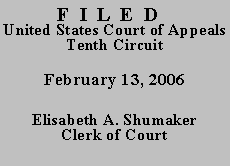

| RANDALL J. CARPENTER,
Plaintiff-Appellant, v. TOM BROWN, INC, a Delaware corporation, Defendant-Appellee. |
|
With both parties fully versed in the facts, we recite only those Mr. Carpenter asserts distinguish his case from Stuart. In the spring of 2001, Cannon Oil & Gas Well Service, Inc., a Wyoming corporation, hired Mr. Carpenter as a floor hand. From its Rock Springs, Wyoming office which issued his paychecks, Cannon later dispatched Mr. Carpenter and two other employees to perform a workover operation on an oil well owned by Tom Brown, Inc., located in Rio Blanco County, near Meeker, Colorado. During the operation, a rubber gasket shot up the drilling pipe, struck Mr. Carpenter's right arm, and amputated it just below the elbow. Mr. Carpenter was transported to Denver, where his injury was treated. Cannon's Wyoming worker's compensation insurance reimbursed the cost of his medical care.
On the basis of these facts, then, aside from the place of his accident and trauma treatment, Mr. Carpenter asserts all of the relevant facts circumscribing his employment history and grounding his lawsuit reside in Wyoming. Only the fortuity of his employer's subcontracting work in Colorado along with his three-day presence at the job site interrupted his otherwise continuous Wyoming employment history.
Invoking diversity jurisdiction, Mr. Carpenter filed his complaint alleging Brown's negligence and seeking monetary damages in the United States District Court for the District of Wyoming. Brown moved to dismiss the complaint on the ground that under Colorado law which, it claimed, governed the action, Brown is a statutory employer and immune from suit. Brown relied upon Colo. Rev. Stat. § 8-41-401(1)(a), (b), which, in part, states:
(1)(a) Any person, company, or corporation operating or engaged in or conducting any business by ... contracting out any part or all of the work thereof to any lessee, sublessee, contractor, or subcontractor, irrespective of the number of employees engaged in such work, shall be construed to be an employer as defined in articles 40 to 47 of this title and shall be liable as provided in said articles to pay compensation for injury or death resulting therefrom to said lessees, sublessees, contractors, and subcontractors and their employees or employees' dependents, except as otherwise provided in subsection (3) of this section.
***
(b) The employer, before commencing said work, shall insure and keep insured against all liability as provided in said articles, and such ... contractor, or subcontractor, as well as any employee thereof, shall be deemed employees as defined in said articles....
Colo. Rev. Stat. § 8-41-401(1)(a), (b) (2001) (emphasis added).
Mr. Carpenter responded, first, that under Wyoming statutes and their interpretation by the Wyoming Supreme Court in Wessel v. Mapco, Inc., 752 P.2d 1363, 1370-71 (Wyo. 1988), his employment was "principally localized" in Wyoming, displacing application of Colorado law. Second, were Colorado law applied, Brown failed to satisfy its prerequisites to immunity. Third, Mr. Carpenter asserted Wyoming's strong public policy in the broad area of protecting its workers and the workers compensation system overrode any interest Colorado might have in the litigation.
The district court granted the motion, however, concluding Colorado's exclusive remedy immunizing Brown from suit ousted its subject matter jurisdiction. Recognizing the action's congruity with Stuart, the district court nonetheless noted its decision:
is not simply based on an arithmetic calculation to determine the rights and responsibilities of the parties. Such an analysis would ignore the important goals and [policies] underlying both States' worker's compensation schemes. The Court is uncomfortable with an analysis that seems to reward fortuitous, or strategic, connections between plaintiffs and defendants that inject uncertainty into the worker's compensation equation - uncertainty that the worker's compensation regimes were supposed to eliminate.
We review the dismissal for lack of subject matter jurisdiction under Fed. R. Civ. Pro. 12(b)(1) de novo and "review findings of jurisdictional facts for clear error." Stuart, 271 F.3d at 1225 (citation omitted); see also, Cooper v. American Auto. Ins. Co., 978 F.2d 602, 611 n. 7 (10th Cir. 1992). Like Stuart, that review here is predicated on the choice of law question. Although Mr. Carpenter would confine Stuart's analysis to its precise facts, the distinctions he draws do not alter or limit Stuart's reach here.
Mr. Stuart, a Wyoming resident like Mr. Carpenter and an employee of a Wyoming construction company, went directly to the Colorado facility where his employer's project superintendent hired him for the Colorado work. Stuart, 271 F.3d at 1224. Mr. Stuart's paychecks, like those of Mr. Carpenter, were issued from his employer's Wyoming office, and Mr. Stuart received benefits, as did Mr. Carpenter, from Wyoming under its worker's compensation fund. Id.
The Stuart court thoroughly examined Colorado and Wyoming constitutional and statutory law as well as case law from other jurisdictions. Its analysis further embraced a discussion of whether Wyoming as a matter of comity would recognize Colorado's exclusive remedy and concluded that result would not violate Wyoming public policy. Id. at 1227. Finding neither a factual nor legal basis to alter that jurisdictional determination here, we agree with the district court and are bound to AFFIRM.
Entered for the Court
Circuit Judge
*. This order and judgment is not binding precedent, except under the doctrines of law of the case, res judicata, and collateral estoppel. The court generally disfavors the citation of orders and judgments; nevertheless, an order and judgment may be cited under the terms and conditions of 10th Cir. R. 36.3.
2. The Honorable William P. Johnson, District Judge, United States District Court of New Mexico, sitting by designation.